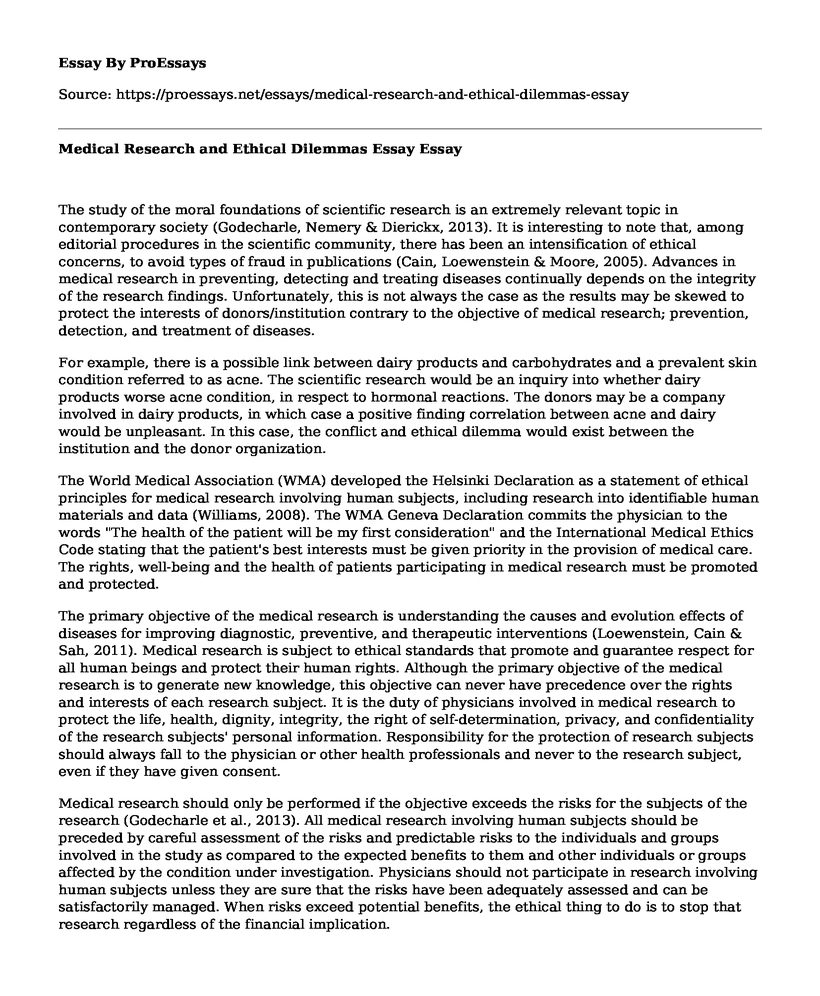The study of the moral foundations of scientific research is an extremely relevant topic in contemporary society (Godecharle, Nemery & Dierickx, 2013). It is interesting to note that, among editorial procedures in the scientific community, there has been an intensification of ethical concerns, to avoid types of fraud in publications (Cain, Loewenstein & Moore, 2005). Advances in medical research in preventing, detecting and treating diseases continually depends on the integrity of the research findings. Unfortunately, this is not always the case as the results may be skewed to protect the interests of donors/institution contrary to the objective of medical research; prevention, detection, and treatment of diseases.
For example, there is a possible link between dairy products and carbohydrates and a prevalent skin condition referred to as acne. The scientific research would be an inquiry into whether dairy products worse acne condition, in respect to hormonal reactions. The donors may be a company involved in dairy products, in which case a positive finding correlation between acne and dairy would be unpleasant. In this case, the conflict and ethical dilemma would exist between the institution and the donor organization.
The World Medical Association (WMA) developed the Helsinki Declaration as a statement of ethical principles for medical research involving human subjects, including research into identifiable human materials and data (Williams, 2008). The WMA Geneva Declaration commits the physician to the words "The health of the patient will be my first consideration" and the International Medical Ethics Code stating that the patient's best interests must be given priority in the provision of medical care. The rights, well-being and the health of patients participating in medical research must be promoted and protected.
The primary objective of the medical research is understanding the causes and evolution effects of diseases for improving diagnostic, preventive, and therapeutic interventions (Loewenstein, Cain & Sah, 2011). Medical research is subject to ethical standards that promote and guarantee respect for all human beings and protect their human rights. Although the primary objective of the medical research is to generate new knowledge, this objective can never have precedence over the rights and interests of each research subject. It is the duty of physicians involved in medical research to protect the life, health, dignity, integrity, the right of self-determination, privacy, and confidentiality of the research subjects' personal information. Responsibility for the protection of research subjects should always fall to the physician or other health professionals and never to the research subject, even if they have given consent.
Medical research should only be performed if the objective exceeds the risks for the subjects of the research (Godecharle et al., 2013). All medical research involving human subjects should be preceded by careful assessment of the risks and predictable risks to the individuals and groups involved in the study as compared to the expected benefits to them and other individuals or groups affected by the condition under investigation. Physicians should not participate in research involving human subjects unless they are sure that the risks have been adequately assessed and can be satisfactorily managed. When risks exceed potential benefits, the ethical thing to do is to stop that research regardless of the financial implication.
Conclusion
Various global treaties and conventions such as the Universal Declaration of Human Rights recognize health as a human right (Bhat, Shah & Sherighar, 2017). As a result, decision-makers in the medical sectors everywhere have the responsibility of protecting and promoting health, which means disclosing negative research results notwithstanding the bottom-line of research donors. Failure to protect the integrity of a research institution by publishing all research findings for whatever reasons translates to an ethical violation and should not be tolerated.
References
Bhat, A., Shah, A., & Sherighar, S. G. (2017). Instructions to prospective authors by Indian biomedical journals: An opportunity to promote responsible conduct of research. Journal of Empirical Research on Human Research Ethics, 12(2), 117-123.
Cain, D. M., Loewenstein, G., & Moore, D. A. (2005). The dirt on coming clean: Perverse effects of disclosing conflicts of interest. The Journal of Legal Studies, 34(1), 1-25.
Godecharle, S., Nemery, B., & Dierickx, K. (2013). Guidance on research integrity: no union in Europe. The Lancet, 381(9872), 1097-1098.
Loewenstein, G., Cain, D. M., & Sah, S. (2011). The limits of transparency: Pitfalls and potential of disclosing conflicts of interest. American Economic Review, 101(3), 423-28.
Williams, J. R. (2008). The Declaration of Helsinki and public health. Bulletin of the World Health Organization, 86, 650-652.
Cite this page
Medical Research and Ethical Dilemmas Essay. (2022, Aug 23). Retrieved from https://proessays.net/essays/medical-research-and-ethical-dilemmas-essay
If you are the original author of this essay and no longer wish to have it published on the ProEssays website, please click below to request its removal:
- Paper Example on Use of Pharmaceutical Cognitive Enhancers
- Research Paper on Health People 2020: Reducing Type 2 Diabetes in the Hispanic Community
- Emphasis on Nutrition and Exercise
- Pneumonia: Infection Affecting Respiratory System and Circulatory System - Essay Sample
- Essay Example on COVID-19: The Global Impact of a Deadly Pandemic
- Paper Sample on A Holistic Approach to CVD Prevention and Control
- Report Sample on Covid-19 and the New Leadership







